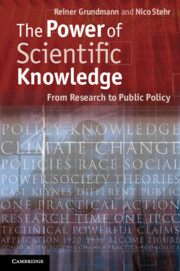5 - Conclusion
Published online by Cambridge University Press: 05 November 2012
Summary
The reader will recall that we introduced several models, questions, and theses in previous chapters, to which we will now return. Let us start with the model of instrumentality, which states that true knowledge is reliable and useful in practical contexts. This model, which may still be widely shared among observers and policymakers, has not come up with a convincing answer to the question of how it is possible that science (“true knowledge”) is effective only in some cases, but not always. To answer this question, we developed the thesis that in order to become practically relevant, knowledge must include the policy options that need to be manipulated, so that the intended change can be effected. To this end we have introduced the distinction between “knowledge for practice” and “practical knowledge.” The former provides knowledge that could be relevant in practical contexts (which highlights the fact that not all knowledge has this property), while the latter provides knowledge that identifies the “levers for action.” We also suggested that in order to be effective, knowledge need not reflect all aspects or variables of reality. Taken together, these points amount to a critical reevaluation of traditional models of the knowledge/power relation, no matter whether they rely on a specific epistemology; on a “linear” conception of the relation between knowledge and power; or on a concept that postulates that in order to be effective, a theory needs first of all to reflect the complexity of reality.
How do the case studies compare to these considerations? What are the practical aims in each of these cases? In economic science and policy, the goal was to use financial instruments available to government in order to compensate for market failure and to overcome a deep economic crisis. Specifically, these policies aimed at the reduction of unemployment and the stimulation of economic activity. In race science and policy, the aim was to bring about a “healthy” population and to weed out “unworthy” life through population policies, ranging from forced sterilization to extermination. In climate science and policy, it is the prevention of dangerous climate change through appropriate mitigation strategies and adaptation to inevitable climate change.
- Type
- Chapter
- Information
- The Power of Scientific KnowledgeFrom Research to Public Policy, pp. 179 - 194Publisher: Cambridge University PressPrint publication year: 2012



